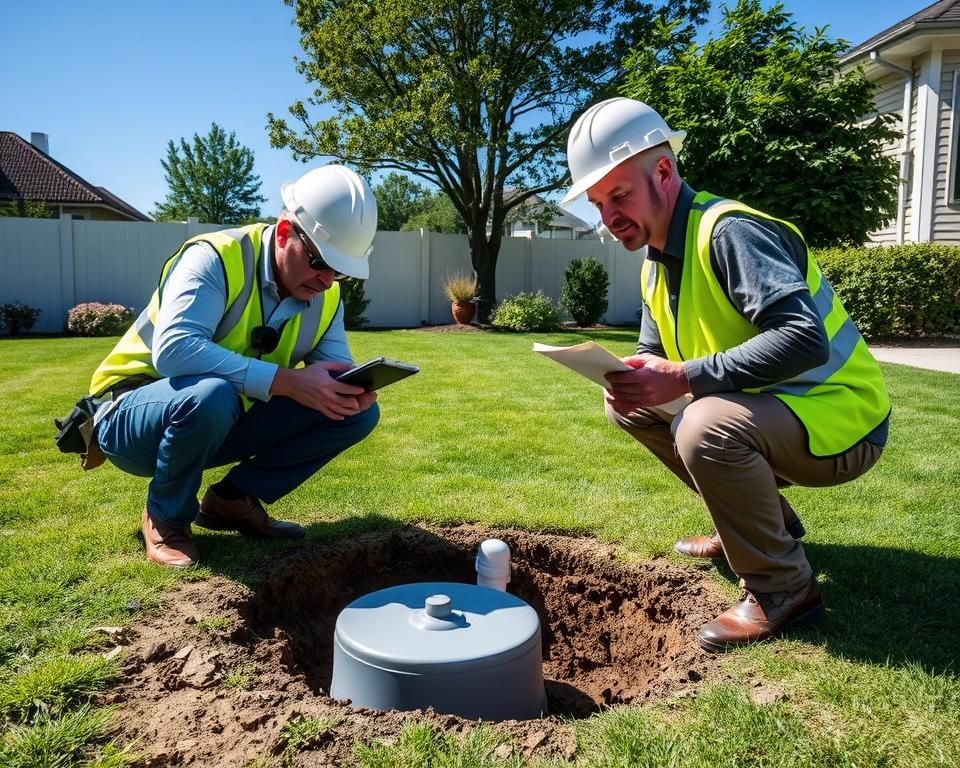Pumping Your Septic System
Have you ever wondered how often you should arrange septic system pumping so you can dodge costly malfunctions? With more than 20 percent of U.S. households relying on septic systems, understanding their maintenance is crucial. Pinpointing the right time to order a septic tank service is key to its lifespan. In addition, there are affordable septic pumping options that provide excellent functionality minus the big price tag. Below, we outline crucial upkeep advice useful for every homeowner.
Salient Features
- Regular septic system pumping is vital for efficient operation.
- Identifying the indicators that suggest the necessity for service can prevent major issues.
- Choosing professional septic system pumpers guarantees reliable maintenance.
- Cost-effective septic pumping options are accessible for homeowners.
- Regular inspections support optimal system performance.
Know How Your Septic System Works
A septic system performs a key role in managing household wastewater, made up of several important components that function together. The initial drain line carries wastewater from your home to the septic tank, where the process starts. In the tank, an underground chamber, solids sink at the bottom, and bacteria digest these solids, processing the waste effectively.
The processed liquid discharge subsequently flows from the septic tank to the distribution box, where it is distributed evenly across the drain field or leach field. Here, the soil extends the filtration, continuing to purify the wastewater. Grasping the functions of these septic system parts is vital. It allows homeowners to oversee and care for their systems efficiently.
Understanding how your septic system runs helps you implement preventive maintenance measures. It’s wise to have regular appointments with licensed cleaners of septic systems – septic system pumping near me. They provide crucial insights for optimal performance of your system. These experts aid in arranging the essential pump-outs and checks. This proactive approach can greatly extend your septic system’s lifespan.
Importance of Septic System Maintenance
Maintaining your septic tank consistently is pivotal for homeowners who aim for their system to last. A well-cared-for system provides peace of mind and safeguards your property’s value. Without adequate care, you’re exposing yourself to system breakdowns and health dangers.
Selecting a first-rate septic pumping service is crucial. They provide timely inspections and pump-outs, clearing out sludge and scum buildup. If maintenance is overlooked, urgent pumping may be required, which is pricey.
Adhering to a consistent maintenance plan is prudent. It entails professional evaluations and regular pumping. This preventative measure heads off urgent issues, providing a more secure living environment for everyone.

Signs Your Septic System Needs Attention
Being alert to septic system issues can sidestep budget-breaking repairs and major damage. Common signs indicate when your system requires a check. These include:
- Delayed drains throughout the house
- Pooling water in the yard above the drain field
- Bad odors near the septic tank or leach field
- Exceptionally thick grass growth in certain areas of your yard
These clues could signify problems that might result in your system failing. Prompt action is vital. Contacting septic pumping specialists for an inspection assists. Timely action stops initial issues from turning into large ones. Plus, routine upkeep guarantees your system operates well and lasts longer.
Septic System Pumping: Best Practices
Timely pumping of your septic tank is essential to prevent hefty clogs and backups. It’s vital to find the ideal schedule for maintenance. Homeowners should generally schedule pumping every 2 to 5 years, based on the tank’s size and household wastewater levels. Intensive use of garbage disposals may necessitate more frequent pumping.
Engaging professional pumpers guarantees your tank gets a full clean and check-up. During pumping, professionals look for any issues, such as faulty baffles. Finding these problems at an early stage prevents bigger expenses and inconveniences later. Routine pumping schedules and expert help ensure your septic system’s trouble-free operation.
Routine Inspections for Optimal Performance
Periodic inspections are vital for your septic system’s efficiency. Septic system inspections reveal early issues before they grow. Professionals advise inspections every three to five years, depending on system size and household usage. This avoids costly fixes.
Keeping maintenance records is crucial for tracking your system’s condition. These records provide insights into previous inspections, repairs, and suitable intervals to schedule septic tank cleaning services. With this information, organizing for future upkeep becomes simpler, maintaining septic systems in optimal shape.
Regular inspections and detailed record-keeping not only enhance system efficiency but also prolong its life. This strategy protects the environment and the investment in a safe, operational home.
| Inspection Type | Recommendation Frequency | Benefits |
|---|---|---|
| Visual Inspection | Annually | Identify surface issues |
| Professional Inspection | Every 3–5 years | Assess functionality and detect problems |
| Septic Tank Pumping | Every 3–6 years | Prevent overflow and system failure |
Using Water Wisely to Improve Septic Longevity
Mindful water use is key for keeping your septic system sound. It not only aids the environment but also improves the performance of your home’s plumbing. By adopting simple, yet effective, conservation methods, homeowners can decrease wastewater.
Space out your laundry activities over the week instead of running back-to-back loads. This helps the septic system to manage water better and avoids tank overflow. Installing low-flow fixtures in your kitchens and bathrooms yields considerable water savings, keeping the water pressure up while reducing the flow rate, thus trimming the amount of wastewater produced each day.
Swiftly fixing leaks is another practice to assist your septic system. Even a small leak can cause a large waste of water, putting extra pressure on the septic system. Through regular inspections and repairs, you greatly aid the system’s efficiency.
Focusing on water conservation isn’t just advantageous for your septic system; it’s also a step towards environmentally responsible living. Making such practices into your daily routine serves both your household and the planet.
Proper Handling of Household Waste
Homeowners play a crucial role in maintaining their septic system’s health by disposing of household waste properly. It’s essential to avoid throwing away non-biodegradable items like wipes, plastics, and other harmful products in the system. These items can cause clogs, causing expensive repairs and a drop in efficiency.
Recycling food scraps and organic materials is a advantageous alternative to sending them to landfill. This practice markedly cuts down on the amount of solid waste entering the septic tank. Focusing on biodegradable waste disposal helps maintain the ecological balance needed for effective waste management.
It’s important to monitor what goes down the drains. Non-decomposable items can requiredemand more frequent septic tank pumping. By learning and following correct waste disposal methods, you can secure a more efficient and long-lasting septic system.
Choosing Septic-Friendly Cleaners
The health of your septic system largely hinges on your choice of cleaning products. Opting for septic-safe cleaning products is crucial. These products protect the balance of beneficial bacteria that digest waste. Many standard cleaners include harmful chemicals that endanger this balance, causing expensive repairs or system failure.
Homeowners should consider natural alternatives that are both powerful and environmentally friendly. Common household items like baking soda, vinegar, and lemon juice are great choices. These natural cleaners are not only capable but also encourage your septic system’s health.
Steering clear of products that contain antibacterial agents and chlorine bleach is vital. Such substances destroy the helpful good bacteria, compromising your system’s functionality. By adopting sustainable products, you protect both the efficiency and longevity of your septic system.
The Role of Bacteria in Your Septic System
Bacteria perform a critical role in keeping your septic system healthy. They break down solids on their own and enhance nutrient processing. A lack of healthy bacteria can lead to system failure, creating costly repairs.
Homeowners can enhance their system by introducing organic additives. These products boost beneficial bacteria, making waste decomposition more efficient. It’s important to opt for organic additives that are advantageous, not harmful, to the septic environment.
A strong bacterial community is essential to a septic system’s longevity and efficiency. It avoids solid buildup and lessens the need for regular pumping. Emphasizing bacterial health makes waste management more effective and eco-friendly.
Conclusion
Septic system care is essential for the life and functionality of your home’s wastewater system. Adhering to essential maintenance tips avoids hefty repairs. Understanding routine pumping and inspections is key. This ensures your septic system stays in peak condition.
Educating yourself on your septic system’s operation and smart approaches in water and waste management is vital. Engaging professionals like All in Sanitation provides expertise. This contributes to your septic system’s long-term health and gives peace of mind.
Investing in proper septic maintenance today yields future benefits. It shields your home and enhances your family’s quality of life. Focusing on septic system care provides certainty with a well-maintained system.


